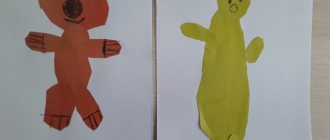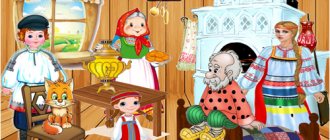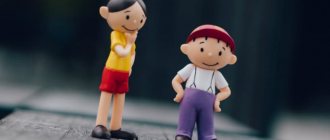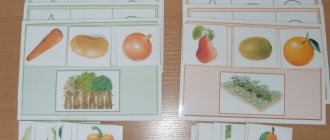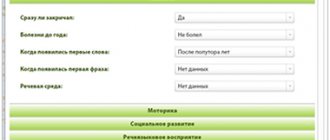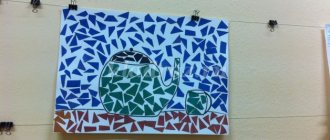Card file of speech therapy games for children with special needs development
Olesya Levchenko
Card file of speech therapy games for children with special needs development
CARD FILE OF Speech Therapy GAMES FOR CHILDREN WITH ODD
Content component.
In recent years, the number of children with speech disorders has increased significantly. And every year the number of practically non-speaking children increases. The reasons for this phenomenon are varied and numerous.
Unfortunately, children with speech disorders often get to see a speech therapist only before school, at best, after five years, and the most significant age for the development of a child’s speech, the age of three, turns out to be missed.
Speech therapy work is based on the principle of repeated repetition of material, and what could be more boring for a preschooler whose leading activity is play? And in order to arouse the child’s interest in classes, the speech therapist must introduce the maximum number of didactic games.
Play is one of the most important methods of working with preschool children. The game method of teaching helps to create an interested, relaxed atmosphere and establish a psychologically age-appropriate communication situation. In play activities, the child’s individuality is revealed, feelings of collectivism and mutual understanding are formed, and children’s creative abilities are developed.
A good, smart and entertaining game activates children's attention, relieves psychological and physical stress, and ensures the perception of new material.
How are games used in speech therapy work?
Thus, we can formulate two main tasks facing a speech therapist in his work with preschoolers.
1. A speech therapist needs to widely use games in correctional work, while remembering their importance in general as a means of physical, mental, moral and aesthetic education of children.
2. When conducting the game, the speech therapist must take into account the possible behavioral characteristics of children with various speech disorders.
The main training from speech therapists comes through exercises on pronunciation and speech development. But you need to remember one important rule! It’s better for your child to leave your lesson without finishing the game than after overplaying it. Thus, a deficit of play is created and the child will definitely want to return to class and will do it with pleasure.
The need for speech therapists to carry out correctional work with preschoolers through play is obvious. The work of a speech therapist requires the use of gaming techniques to an even greater extent than in conventional educational activities. The presence of a speech defect leads to changes in the mental sphere, namely the appearance of such traits as increased irritability, excitability, isolation, etc.
In modern methodological literature on speech therapy, various games are recommended when working with preschool children. The authors of methodological literature strongly recommend the use of games to correct speech disorders in children. In many cases, examples of such games are given, which are modified versions of games well known in preschool pedagogy, but they are often invented by the authors themselves.
As a rule, the bulk of games and game aids are aimed at automating sounds and developing coherent speech in preschoolers. But since I work with children with special needs, I also need to cover vocabulary and grammatical structure of speech. Therefore, the basis of this methodological development was the systematization of games and gaming aids necessary for teaching senior preschoolers with ODD. Here we will present the author's developments of games tested in practice, as well as games already presented in modern methodological literature.
Increasingly, in the senior and school-preparatory groups of kindergarten, children are diagnosed with GSD (general speech underdevelopment). This is a systemic disorder in which sound pronunciation, phonemic perception, syllable structure and sound pronunciation of words are impaired, and speech is saturated with agrammatisms. Children have a poor vocabulary. Coherent speech suffers. There are also deviations in the development of motor skills, both general and articulatory.
As a result, children encounter difficulties in the learning process and poorly assimilate program material. In this regard, there is a need to use effective methods of teaching and correctional work that ensure that children successfully master the knowledge, skills and abilities provided for by the program, and play comes to the rescue and the direction of correctional work becomes important. The advantage of the game is that it allows you to more actively influence the child. With the help of games, a strong interest in classes, a desire to learn new things and assimilate knowledge and skills are maintained.
Games aimed at developing fine motor skills.
1. PALM. The contours of the palms are drawn on a sheet of paper. Each page contains a different position of the palms (fingers together, apart, bent, etc.) The child, placing his palms, must repeat the image as accurately as possible.
2 ROLLING THE BALLS. Children roll small balls around the table (along the playing field on which you can draw different paths - straight, curved, spiral). During the game, the ball should not slip out from under the palm and should roll exactly along the path. Balls can be rolled either with your palms (in the first games) or with one finger (in subsequent games).
3. SORTING SMALL ITEMS. It is very important that the baby does this either with a pinch (with three fingers), or using the “tweezer grip” method (grabbed with two fingers - the thumb and forefinger). At the same time, the other fingers should be tucked in and not interfere. Show the baby the correct way to do this exercise. You can sort by color (if you mixed beads of two colors, by shape, by size. Sorting small items is very important in the third year of a child’s life.
4. KNEADING PLASTICINE. This is a very useful exercise for developing fine motor skills.
5. STRINGING RINGS ON THE PYRAMID ROD. First, the baby learns to disassemble the pyramid toy (this is easier), and only then assemble it. Please note - even the smallest children easily remember the sequence of colors in the pyramid and assemble it simply from memory, and not from comparing values. Therefore, if you want to teach them to compare size of the rings and arrange them from largest to smallest sequentially, then you need a pyramid with rings of the same color!
Development of articulatory motor skills
To present the exercise to preschoolers in a non-boring way, we select pictures and poems for each exercise. Games aimed at developing and activating vocabulary.
1. ADD A WORD
Several people play. The first one names an object. The second repeats this word and adds one of his own, the third repeats the first two in order and names his own, etc. until someone gets confused. The game promotes the development of voluntary attention and memory.
2. VERBAL DOMINO
Several people play. Everyone takes turns pronouncing any phrases, but with a certain condition: each next player begins his phrase with the last word of the previous player’s sentence.
3. SIGNS OF WORDS
The child is told:
1st option. “Now I will name the words, and you must tell me what this object can do. For example, a blizzard is blowing, and thunder is ?; wind -. , and snow -. ; rain - and sun -. With each answer, the child is asked: “What else does the sun do, because it not only shines?” The child must select as many words as possible that denote the action. The same game can be played in reverse: “Who flies? Who swims? Who hammers the nails? Who catches mice?
2nd option. “Name another object that is as white as snow” (as narrow as a ribbon; as fast as a river; as round as a ball; as yellow as a melon, etc.).
3rd option. “Compare by taste - lemon and honey, onion and apple, by color - cloves and chamomile, pear and plum, by strength - rope and thread, stone and clay, by width - road and path, river and stream, by height - bush and tree, mountain and hill."
4. WORDS ARE FRIENDS
The child is asked to choose synonyms for the given words:
1st option. How can you say differently about a sad person? (Sad, upset.)
2nd option. What word can replace the word “horse”? (Doctor, horse, cup, food, etc.)
5. FOUR ONE
The child is asked to determine which word is superfluous, not suitable for other words, and explain why:
Sad, sorrowful, dejected, deep;
Brave, loud, courageous, daring;
Weak, brittle, long, fragile;
Strong, distant, durable, reliable.
If a child does not understand the meaning of a word, it should be explained to him.
3rd option. “Compare by taste - lemon and honey, onion and apple, by color - cloves and chamomile, pear and plum, by strength - rope and thread, stone and clay, by width - road and path, river and stream, by height - bush and tree, mountain and hill."
4. WORDS ARE FRIENDS
The child is asked to choose synonyms for the given words:
1st option. How can you say differently about a sad person? (Sad, upset.)
2nd option. What word can replace the word “horse”? (Doctor, horse, cup, food, etc.)
5. FOUR ONE
The child is asked to determine which word is superfluous, not suitable for other words, and explain why:
Sad, sorrowful, dejected, deep;
Brave, loud, courageous, daring;
Weak, brittle, long, fragile;
Strong, distant, durable, reliable.
If a child does not understand the meaning of a word, it should be explained to him.
Didactic games for the formation of grammatical structure of speech can be divided into three main groups:
Games and exercises for inflection:
- they learn to use case forms correctly, the most difficult of which for them is the genitive plural, games: “What’s missing?”, “What’s missing from the doll?”, “Paired pictures”, etc.
- use indeclinable nouns such as coat, coffee, radio, kangaroo, games “Atelier”, “Cafe”, etc.)
- correctly coordinate adjectives with nouns in gender, number, case and coordinate with verbs and prepositions. (“Which, Which, Which?”, “Who is doing what?”, “Guess what it is?”, “Tell about the subject”).
- distinguish verbs by aspect, person, number, tense, gender and mood. A special place is occupied by games for the correct use of so-called “difficult” verbs: want, call, run, etc. (games “Do you want? - We want”, “Hello, hello.”, etc.).
Games and exercises for word formation:
Didactic games for word formation can be divided into 4 subgroups:
Formation of baby animal names
Formation of profession names
Formation of names of dishes
Formation of cognates
In the field of word formation, preschoolers are taught to create new (same-root) words using:
· suffixes: hare - bunny, bunny;
· prefixes: sew - sew, sew up, embroider;
· mixed method: tabletop, running, running, etc.
The learning process includes games that help you understand the change in the meaning of a word depending on word-formation shades: mustache - mustache - mustache; cat - cat - cat. The teacher teaches the children to form adjectives from the stems of nouns: What kind of raspberry jam? From strawberries? From currants?; and the formation of possessive adjectives (the meaning of belonging).
Games and exercises to improve the syntactic side of speech.
Mastery of the syntactic structure of speech occurs in the process of verbal communication, where the main methodological technique is the teacher’s questions: “Why?”, “Why?”, “What would happen if...”.
An important means of developing preschoolers’ skills in constructing sentences of different types are special games and exercises: “Complete the sentence”, “Complete the sentence”, “Who should we take for a ride?”, “Blurred letter”, etc.
Games aimed at developing coherent speech
Word game “Let’s weave a wreath of sentences.” The teacher pronounces a sentence, and the children find the last word in it and come up with a sentence with it, etc. For example: 1. Seryozha is reading a book. 2. The book is on the table. 3. My desk is clean. 4. Clean hands are the key to health, etc.
Game "Riddle and Guess". The driver (adult or child, using cards - “definitions and signs” of the word. Players try to find the hidden object. The one who guessed right becomes the driver.
Game "Make a story." The teacher gives each child a diagram card with conventional images: the sun, a tree, a feeder, birds and offers to compose a story on the topic “Migratory Birds” according to the diagram. Thus, stories are compiled on different lexical topics.
Game "Shop". Using models, the child describes vegetables, fruits, furniture, clothes, etc.
A didactic game is one of the forms of teaching influence of teachers on a child, at the same time, the game is the main activity of children. Thus, the game realizes educational (which the teacher pursues) and gaming (for which the child acts) goals. It is important that these two goals complement each other and ensure the assimilation of program material. A didactic game is a valuable means of cultivating mental activity; it activates mental processes and arouses a keen interest in the process of cognition in preschoolers. The game helps to make any educational material exciting, causes deep satisfaction in children, stimulates performance, and facilitates the process of assimilation of knowledge.
Card file of individual lessons on audio automation [р]
Card No. 1, sound [P]
1. Perform articulation gymnastics: Fence, Tube, Clock, Swing, Delicious Jam, Horse, Fungus, Painter.
2. “Motorcycle” - say clearly to others
3. Repeat the syllables. Dra Dro Dru Dru
4. Play the words. Drap, woodcutter, drama, thrush, shot, yeast, friend, squad.
5. Match the words: One woodcutter, two....., five... One friendship, two..., five...
6. Game “One-many” Thrush-..., woodcutter-..., drap-..., brawler-..., dragon-..., friend-..., fraction-..., bustard-... .
7. Change the sentences: I call my friends. You... He... She... We... They... I see a friend. You... He... She... We... They...
Card No. 2. (P)
1. Perform articulation gymnastics: Fence, Tube, Clock, Swing, Delicious Jam, Horse, Fungus, Painter.
2. “Motorcycle” - say clearly drrrrrr
3. Repeat after me the words: fighter, dragon, jelly bean, tremble, yeast, bustard, firewood, friends, squad, other.
4. Count: One fight, two..., five... One friend, two..., five...
5. Game “Name it affectionately” Dragon-..., friend-..., firewood-...
6. Continue the sentences. I'm carrying firewood. You... He... She... We.. They... I read about friends. You... He... She... We... They...
7. Repeat the sentences. The hare is trembling with fear. Tanya is shivering from the cold. Vanya is friends with Gena. A blackbird sits on a branch.
Card No. 3. (P)
1. Perform articulation gymnastics: Fence, Tube, Clock, Swing, Delicious Jam, Horse, Fungus, Painter.
2. “Motorcycle” - say clearly to others.
3. Repeat the syllables: Dra Dro Dru Dry
4. Repeat the words: core, bucket, thigh, powder, otter, wise, generous
5. Game “One-Many” Cedar-..., frame-..., otter-..., bucket-..., friend-...
6. Change the sentences: I am carrying the cannonball. You... He... She... We... They... I'm calling Volodya. You... He... She... We... They...
7. Repeat the sentences after me. The blackbird sat down on the cedar. A friend's bucket hurts. Otters live elsewhere. The stove needs wood to burn.
Card No. 4, sound [P]
1. Perform articulation gymnastics: Fence, Tube, Clock, Swing, Delicious Jam, Horse, Fungus, Painter.
2. “Motorcycle” - say clearly to others.
3. Repeat the syllables: Adra Odro Udru
4. Say the words: core, bucket, thigh, powder, otter, cheerful, wise, generous
5. Game “Call it affectionately” Friend-..., girlfriend-..., dragon-..., square-..., firewood-..., bucket-..., core-..., hip-...
6. Continue the sentences: I see a friend. You... He... She... We... They... I'll circle the bucket. You... He... She... We... They...
Card No. 5, sound [P]
1. Perform articulation exercises: Fence, Tube, Clock, Swing, Delicious Jam, Horse, Fungus, Painter.
2. “Motorcycle” - say clearly to others
3. Repeat the syllables. Tra Tro Tru Tra
4. Say the words. Ladder, grass, track, meal, cable, throne, troika, cane, path, labor, coward, pipe, difficult
5. Match: One three, two... five... One trumpet, two... five... One coward, two... five...
6. Finish the sentence. The queen sits on... A chimney sweep cleans... A trumpeter plays on... He rides on rails in the city... Misha studies for C grades... In the spring, green appears... Cars rush along...
Card No. 6, sound [P]
1. Perform articulation gymnastics: Fence, Tube, Clock, Swing, Delicious Jam, Horse, Fungus, Painter.
2. “Motorcycle” - say clearly to others
3. Repeat the syllables. Tra-tro Tro-tra Tro-tra Tro-tra
4. Say the words. Grass, tram, trench, worker, reed, pipe, trumpeter, chimney sweep
5. Make sentences with words. Alyosha, tram. Car, highway Reed, swamp Coward, dog Grass, trench
6. Match the words in the sentence I am walking on the grass. You... He... She... We... They... I'm running along the path. You...He...She...We...They... I see a trolleybus. You... He... She... We... They...
7. Say the phrases. Grass near the path, strange morning, fast stream, pipe in the trench.
Card No. 7, sound [P]
1. Perform articulation gymnastics: Fence, Tube, Clock, Swing, Delicious Jam, Horse, Fungus, Painter.
2. “Motorcycle” - say clearly to others
3. Repeat the syllables: Tra, tro, tru, tra
4. Say the words. Sailor, cartridge, notebook, metro, citro, cartridge, cheesecake, parsley, excerpt.
5. Say it kindly. Sailor-..., cartridge-..., notebook-..., sailor-..., cheesecake-..., excerpt-...
6. Negotiate the offer. Eating underground (what?) The student took out a pen and (what?) Grandmother baked it with cottage cheese (what?) Lying on the bed under the sheet (what?) They do exercises (when?)
7. Change the sentence. I'll take the subway. You... He... She... We.... They... I touch the notebooks. You... He... She... We... They..
Card No. 8, sound [P]
1. Perform articulation exercises: Fence, Tube, Clock, Swing, Delicious Jam, Horse, Fungus, Painter.
2. “Motorcycle” - say clearly
3. Repeat the syllables. Atra, otro, morning
4. Repeat the words. Morning, leggings, meter, liter, theater, sturgeon, examination, pediatrician.
5. Change the sentences. I eat sturgeon. You.. He... She... We... They... I will be a pediatrician. You...He...She...We...They...
6. Repeat the sentences. Peter has three in his notebook. Mom guts the sturgeon. The sailor walks along the ladder. Three people are planting parsley. The sailors are waiting for the tram. There is a theater near the metro.
7. Say pure sayings. Tra-tra-tra-we're going to kindergarten in the morning. Tor-tor-tor-Peter is riding the metro. We brush our teeth in the morning. Three-three-three-in a fairy tale, gnomes are cunning
Card No. 9, sound [P]
1. Perform articulation exercises: Fence, Tube, Clock, Swing, Delicious Jam, Horse, Fungus, Painter.
2. “Car” - say clearly
3. Say the syllables: Tra-dra, tro-dro, tru-dru, tra-dra...
4. Count: One cartridge, two..., five... One cedar, two..., five...
5. Insert the missing letter: Fyodor has many friends. Trolleybuses go one after another. We can sing like crazy.
6. Finish the sentence: Olya imitates the trumpeter, and Dima... The tree is reflected in the water, and the birch... Nastya was tearing off a leaf, and Petya... Olya was shivering from the cold, and Misha... Marina was kicking her legs, and Mitya... Nadya was washing a bucket with sand, and Oleg...
Card number 10, sound [P]
1. Perform articulation gymnastics: Fence, Tube, Clock, Swing, Delicious Jam, Horse, Fungus, Painter.
2. “Car” - say clearly tr-rr-r-r
3. Repeat the syllables: Atr, otr, morning, itr, etr, adr, odr, udr, idr, edr...
4. Repeat the words: Dragee, kernels, hips, powder, otter, firewood, friends, other, be friends.
5. Do the math. One meter, two..., five...
6. Change phrases: I have generous friends. You... You..., He..., She..., They...
7. Make sentences with words. On the grass From the pipe With a girlfriend To the subway
8. Say pure sayings: Dra-dra-dra-the rain pours like a bucket, Dr-dro-dro-sailor carries the bucket, Dru-dru-dru-drone climbs the bucket, Dri-dru-dru-dru-dru-dru-drugs are cunning and wise.
Card No. 11, sound [P]
1. Perform articulation gymnastics: Fence, Tube, Clock, Swing, Delicious Jam, Horse, Fungus, Painter.
2. “Motorcycle” - say clearly drrrrrr
3. Repeat the syllables: Stra, stro, stru, stra, vtra, vtro, vtru, vtry
4. Say the words: Jet, plan, country, sister, shavings, construction, ostrich, fear, construction, jets, strings, structure, line, strict.
5. Change the sentences: I am building a house. You... He... She... We... They... I see an ostrich. You... He... She... We... They... I'm going to another country. You...He..She..We..They..
6. Repeat the sentences: The tram is moving fast. The ostrich has fast legs. My sister has a lot of colorful ribbons. Tomorrow morning I will congratulate my mother. Peter has tea for breakfast. The builders quickly built the house.
Card number 12, sound [P]
1. Perform articulation gymnastics: Fence, Tube, Clock, Swing, Delicious Jam, Horse, Fungus, Painter.
2. “Motorcycle” - say clearly to others
3. Repeat the syllables: Shtra-stra-shtra Shtro-stro-shtro Shtro-stro-stro Shtro-stro-stro
4. Repeat the words: Fine, tomorrow, breakfast, island, spicy, fast, motley
5. Change the sentences: I read quickly. I'm sweeping up the shavings. You... He... She... We... They...
6. Finish the sentence: Vanya has one sharp knife, and Vitya has two... Tanya has one colorful sock, and Zhenya has two... Petya has one fast car, and Misha... Sasha has one strict teacher, and Lyuda has two...
Author of the material: Tatyana Viktorovna Vinogradova
Also on topic:
File of tasks for audio automation R

